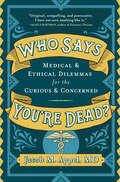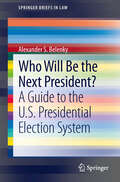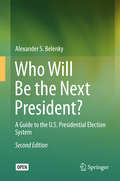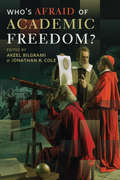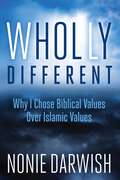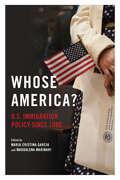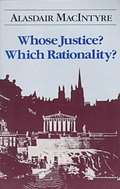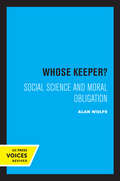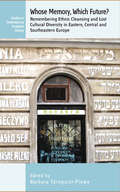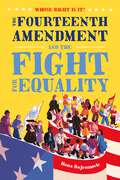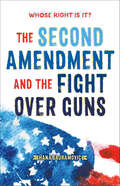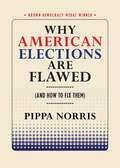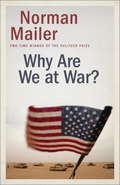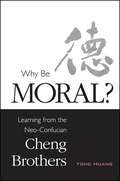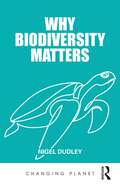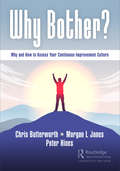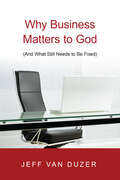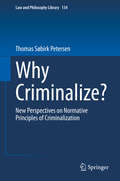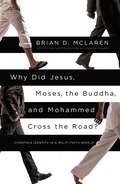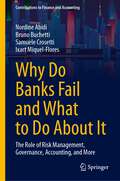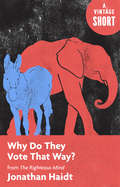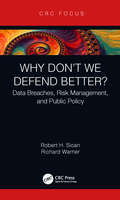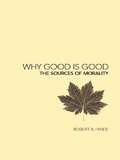- Table View
- List View
Who Says You're Dead?: Medical & Ethical Dilemmas for the Curious & Concerned
by Jacob M. Appel“An original, compelling, and provocative exploration of ethical issues in our society, with thoughtful and balanced commentary. I have not seen anything like it.” —Alan Lightman, author of Einstein’s Dreams Drawing upon the author’s two decades teaching medical ethics, as well as his work as a practicing psychiatrist, this profound and addictive little book offers up challenging ethical dilemmas and asks readers, What would you do?A daughter gets tested to see if she’s a match to donate a kidney to her father. The test reveals that she is not the man’s biological daughter. Should the doctor tell the father? Or the daughter?A deaf couple prefers a deaf baby. Should they be allowed to use medical technology to ensure they have a child who can’t hear? Who should get custody of an embryo created through IVF when a couple divorces? Or, when you or a loved one is on life support, Who says you’re dead? In short, engaging scenarios, Dr. Appel takes on hot-button issues that many of us will confront: genetic screening, sexuality, privacy, doctor-patient confidentiality. He unpacks each hypothetical with a brief reflection drawing from science, philosophy, and history, explaining how others have approached these controversies in real-world cases. Who Says You’re Dead? is designed to defy easy answers and to stimulate thought and even debate among professionals and armchair ethicists alike.
Who Will Be the Next President?
by Alexander S. BelenkyThis book addresses the peculiarities of the current presidential election system not yet addressed in other publications. It argues that any rules for electing a President that may have a chance to replace the current ones should provide an equal representation of states as equal members of the Union, and of the nation as a whole. This book analyzes the National Popular Vote plan and shows that this plan may violate the Supreme Court decisions on the equality of votes cast in statewide popular elections held to choose state electors. Thus, the National Popular Vote plan may violate the Equal Protection Clause of the Fourteenth Amendment. The book proposes a new election system in which the will of the states and the will of the nation as a whole are determined by direct popular elections for President and Vice President in the 50 states and in D.C. This system a) would elect President a candidate who is the choice of both the nation as a whole and of the states as equal members of the Union, b) would let the current system elect a President only if no such candidate exists, and c) would encourage the candidates to campaign nationwide. From the contents: The initial design of the Electoral College: basic ideas, logical mistakes, and overlooked problems.- The Electoral College today.- Curbing contingent elections.- Inconvenient facts about the Electoral College.- The Electoral College and campaign strategies.- The National Popular Vote plan: a brilliant idea or a dead-on-arrival delusion?.- Equalizing the will of the states and the will of the nation.- Conclusion.
Who Will Be the Next President?
by Alexander S. BelenkyThis book addresses the peculiarities of the current presidential election system not yet addressed in other publications. It argues that any rules for electing a President that may have a chance to replace the current ones should provide an equal representation of states as equal members of the Union, and of the nation as a whole. This book analyzes the National Popular Vote plan and shows that this plan may violate the Supreme Court decisions on the equality of votes cast in statewide popular elections held to choose state electors. Thus, the National Popular Vote plan may violate the Equal Protection Clause of the Fourteenth Amendment. The book proposes a new election system in which the will of the states and the will of the nation as a whole are determined by direct popular elections for President and Vice President in the 50 states and in D. C. This system a) would elect President a candidate who is the choice of both the nation as a whole and of the states as equal members of the Union, b) would let the current system elect a President only if no such candidate exists, and c) would encourage the candidates to campaign nationwide. From the contents: The initial design of the Electoral College: basic ideas, logical mistakes, and overlooked problems. - The Electoral College today. - Curbing contingent elections. - Inconvenient facts about the Electoral College. - The Electoral College and campaign strategies. - The National Popular Vote plan: a brilliant idea or a dead-on-arrival delusion?. - Equalizing the will of the states and the will of the nation. - Conclusion.
Who's Afraid of Academic Freedom?
by Jonathan Cole Akeel BilgramiIn these seventeen essays, distinguished senior scholars discuss the conceptual issues surrounding the idea of freedom of inquiry and scrutinize a variety of obstacles to such inquiry that they have encountered in their personal and professional experience. Their discussion of threats to freedom traverses a wide disciplinary and institutional, political and economic range covering specific restrictions linked to speech codes, the interests of donors, institutional review board licensing, political pressure groups, and government policy, as well as phenomena of high generality, such as intellectual orthodoxy, in which coercion is barely visible and often self-imposed.As the editors say in their introduction: "No freedom can be taken for granted, even in the most well-functioning of formal democracies. Exposing the tendencies that undermine freedom of inquiry and their hidden sources and widespread implications is in itself an exercise in and for democracy."
Wholly Different: Why I Chose Biblical Values Over Islamic Values
by Nonie DarwishWestern countries are ignorant of true Islamic values, says Nonie Darwish. Darwish is an Egyptian-American, former-Muslim human rights activist who is frustrated with mainstream America's talk of tolerance and assimilation. <P><P>In Wholly Different, Darwish sets non-Muslims straight about tenets of Islam that are incompatible with free society. <P><P>For the first time, Darwish tells the whole story of her personal break with Islam, starting with the brutal physical violence and rigid class system she witnessed and culminating with the spine-tingling visit she received from President Nasser after her father, fedayeen commander Mustafa Hayez, was assassinated by Israeli Defense Forces. <P><P>She lays out the "seventh-century values" of Islam that religious extremists are so intent on protecting through global warfare—values that set Islam apart from the other Abrahamic religions.
Whose America?: U.S. Immigration Policy since 1980
by Elliott Young Carl Lindskoog Julia Rose Kraut Yael Schacher Monique Laney Leisa J Abrego Carly Goodman Julio Capó Jr. Carl Bon TempoA centerpiece of contemporary politics, draconian immigration policies have been long in the making. Maria Cristina Garcia and Maddalena Marinari edit works that examine the post-1980 response of legislation and policy to issues like undocumented immigration, economic shifts, national security, and human rights. Contributors engage with a wide range of ideas, including the effect of the Illegal Immigration Reform and Immigrant Responsibility Act and other laws on the flow of migrants and forms of entry; the impact of neoliberalism and post-Cold War political realignment; the complexities of policing and border enforcement; and the experiences of immigrant groups in communities across the United States. Up-to-date yet rooted in history, Whose America? provides a sophisticated account of recent immigration policy while mapping the ideological struggle to answer an essential question: which people have the right to make America their home or refuge? Contributors: Leisy Abrego, Carl Bon Tempo, Julio Capó, Jr., Carly Goodman, Julia Rose Kraut, Monique Laney, Carl Lindskoog, Yael Schacher, and Elliott Young
Whose Justice? Which Rationality?
by Alasdair MacintyreWhose Justice? Which Rationality?, the sequel to After Virtue, is a persuasive argument of there not being rationality that is not the rationality of some tradition. MacIntyre examines the problems presented by the existence of rival traditions of inquiry in the cases of four major philosophers: Aristotle, Augustine, Aquinas, and Hume.
Whose Keeper?: Social Science and Moral Obligation
by Alan WolfeWhose Keeper? is a profound and creative treatise on modernity and its challenge to social science. Alan Wolfe argues that modern liberal democracies, such as the United States and Scandinavia, have broken with traditional sources of mortality and instead have relied upon economic and political frameworks to define their obligations to one another. Wolfe calls for reinvigorating a sense of community and thus a sense of obligation to the larger society. This title is part of UC Press's Voices Revived program, which commemorates University of California Press’s mission to seek out and cultivate the brightest minds and give them voice, reach, and impact. Drawing on a backlist dating to 1893, Voices Revived makes high-quality, peer-reviewed scholarship accessible once again using print-on-demand technology. This title was originally published in 1989.
Whose Memory? Which Future?: Remembering Ethnic Cleansing and Lost Cultural Diversity in Eastern, Central and Southeastern Europe (Contemporary European History #18)
by Barbara Törnquist-PlewaScholars have devoted considerable energy to understanding the history of ethnic cleansing in Europe, reconstructing specific events, state policies, and the lived experiences of victims. Yet much less attention has been given to how these incidents persist in collective memory today. This volume brings together interdisciplinary case studies conducted in Central and Eastern European cities, exploring how present-day inhabitants "remember" past instances of ethnic cleansing, and how they understand the cultural heritage of groups that vanished in their wake. Together these contributions offer insights into more universal questions of collective memory and the formation of national identity.
Whose Right Is It? The Fourteenth Amendment and the Fight for Equality (Whose Right Is It?)
by Hana BajramovicDiscover the truth about the Fourteenth Amendment, civil rights, and the United States’ continued fight for equality in this singular nonfiction book for young readers.The Fourteenth Amendment to the U.S. Constitution, known as the “equality amendment,” was passed in the years after the Civil War to help protect the rights and freedoms of Black Americans. In the centuries that followed, the amendment grew to protect the rights of women, immigrants, and LGBTQ+ people as well.But in recent years, the scope of the Fourteenth Amendment has shifted dramatically. A series oflandmark Supreme Court cases—ranging from abortion to affirmative action—have rolled back the amendment’s guarantees and called into question its usefulness as a tool in the fight for equality. What doesthe future hold for the Fourteenth? Hana Bajramovic’s Whose Right Is It? The Fourteenth Amendment and the Fight for Equality explores how one amendment to the Constitution shaped civil rights and liberties in America and became the focus for many of today’s most important political debates. Featuring historical photos and informative graphics, this book shows a new generation of activists what the fight for equality across race, sexuality, gender, and citizenship might look like in the years to come.
Whose Right Is It? The Second Amendment and the Fight Over Guns
by Hana BajramovicDiscover the truth about the Second Amendment, the NRA, and the United States’ centuries-long fight over guns in this first-of-its-kind book for middle grade readers."A compelling, clear analysis of one of our country’s oldest dilemmas: how to balance gun rights with public safety. It tells the full and true story of the Second Amendment, and points to a way to bring sanity to our gun laws. A remarkable primer for all ages." —Michael Waldman, author of The Second Amendment: A Biography For the majority of the United States’ history, the right to own a gun belonged to a “well regulated militia.” That changed in 2008 with the historic District of Columbia v. Heller case, which ruled that the Second Amendment protected an individual’s right. In the years since, the debate over gun legislation has reached a crescendo. And the issue grows ever relevant to children across America, with an estimated three million exposed to shootings every year. From metal detectors to see-through backpacks to shooting drills, kids face daily reminders of the threat of guns. Hana Bajramovic's Whose Right Is It? The Second Amendment and the Fight Over Guns reveals how a once obscure amendment became the focus of daily heated debate. Filled with historical photos and informative graphics, the book will show young readers how gun legislation has always been a part of American history and how money, power, and systemic racism have long dictated our ability to own guns.A Junior Library Guild Selection"Hana Bajramovic provides readers with a compelling overview on the history of guns in the United States and the changing, conflicting interpretations of the Second Amendment certain to stimulate conversation and thinking on the part of future generations." —Award-winning author Doreen Rappaport
Why American Elections Are Flawed (Brown Democracy Medal)
by Pippa NorrisThe flaws in the American electoral process have become more apparent over many years. The contemporary tipping point in public awareness occurred during the 2000 election count, but several major structural weaknesses exacerbated doubts in the 2016 campaign, worsening party divisions and further corroding public trust in the electoral process. It is impossible to fix a problem without understanding its nature. To gather independent evidence about the quality of elections around the world, the Electoral Integrity Project (EIP), an independent project with a research team based at Harvard and Sydney universities, was established in 2012. According to expert estimates developed by EIP, the 2012 and 2014 elections in the United States were the worst among all Western democracies. Without reform, these problems risk damaging the legitimacy of American elections—further weakening public confidence in the major political parties, Congress, and the US government, depressing voter turnout, and exacerbating the risks of contentious outcomes fought through court appeals and public protests.Why American Elections Are Flawed (and How to Fix Them) describes several major challenges observed during the 2016 US elections, including deepening party polarization over basic electoral procedures, the serious risks of hacking and altering official records, the consequences of deregulating campaign spending, and the lack of federal standards and professional practices in electoral management. Pippa Norris outlines the core concept and measure of electoral integrity, the key yardstick used by the EIP to evaluate free and fair elections. She compares cross-national and state-level evidence from expert and mass surveys to diagnose problems in American elections. She shows how these challenges could be addressed through several practical steps designed to improve American electoral procedures and practices. If implemented, the reforms recommended by the EIP will advance free and fair elections at home and abroad.
Why Are We at War?
by Norman MailerBeginning with his debut masterpiece, The Naked and the Dead, Norman Mailer has repeatedly told the truth about war. Why Are We at War? returns Mailer to the gravity of the battlefield and the grand hubris of the politicians who send soldiers there to die. First published in the early days of the Iraq War, Why Are We at War? is an explosive argument about the American quest for empire that still carries weight today. Scrutinizing the Bush administration's words and actions, Mailer unleashes his trademark moral rigor: "Because democracy is noble, it is always endangered. . . . To assume blithely that we can export democracy into any country we choose can serve paradoxically to encourage more fascism at home and abroad."
Why Be Moral?: Learning from the Neo-Confucian Cheng Brothers (SUNY series in Chinese Philosophy and Culture)
by Yong HuangYong Huang presents a new way of doing comparative philosophy as he demonstrates the resources for contemporary ethics offered by the Cheng brothers, Cheng Hao (1032–1085) and Cheng Yi (1033–1107), canonical neo-Confucian philosophers. Huang departs from the standard method of Chinese/Western comparison, which tends to interest those already interested in Chinese philosophy. While Western-oriented scholars may be excited to learn about Chinese philosophers who have said things similar to what they or their favored philosophers have to say, they hardly find anything philosophically new from such comparative work. Instead of comparing and contrasting philosophers, each chapter of this book discusses a significant topic in Western moral philosophy, examines the representative views on this topic in the Western tradition, identifies their respective difficulties, and discusses how the Cheng brothers have better things to say on the subject. Topics discussed include why one should be moral, how weakness of will is not possible, whether virtue ethics is self-centered, in what sense the political is also personal, how a moral theory can be of an antitheoretical nature, and whether moral metaphysics is still possible in this postmodern and postmetaphysical age.
Why Biodiversity Matters (Changing Planet)
by Nigel DudleyAll life on Earth has the right to exist, but as we teeter on the verge of a sixth extinction this book discusses why biodiversity matters and why we should care if species go extinct. We are witnessing the largest and fastest rate of extinction in the history of the planet. While the concept of rights is a human one, all plants and animals strive to survive, and this book argues for their rights to continue doing so without being driven into premature extinction by human actions. Acknowledging and describing the practical reasons for conserving biodiversity, this book argues that these should not overshadow the compelling ethical reasons to care about the future of species other than our own. However, the issues are complex. What do we do when faced with an immediate ethical choice where biodiversity rights, animal rights, human rights, economic development and ecosystem survival all get mixed up together? There are seldom hard and fast answers, but thinking about and understanding a variety of points of view will help us make informed trade-offs. Drawing on his vast practical experience, the author presents insightful perspectives and real-world examples with the hope that this book will instigate a much-needed rethink about why and how we practise conservation. This book is essential reading for all those concerned with sustaining our planet, and all who inhabit it, in the face of climate breakdown, biodiversity loss and ecological collapse.
Why Bother?: Why and How to Assess Your Continuous-Improvement Culture
by Peter Hines Chris Butterworth Morgan L. JonesThis book focusses on the importance of creating an internal assessment program to periodically assess the maturity of the organizations transformation journey. It discusses the best approach to designing and implementing an assessment program by answering key questions posed when people resist. The book begins with selecting the positioning of the program not as an audit but as an opportunity to review strengths and opportunities, through to selecting senior leader support to design of the program and developing the assessors. More than 10 case studies are documented to show how organizations have approached their assessment programs, lessons learned, and successes and challenges faced. The book leads the reader through the process of selling the concept and importance of transformation and Lean assessments to embed the desired behaviors within workplace culture. With many case studies, the reader is guided to design their own programs and develop their own assessors. This increases the probability of sustainability of the transformation program by focusing on and maturing the behaviors the transformation programs are trying to drive. For example, one of the most well-known assessments is the Shingo prize -- This book explains the thinking behind the Shingo model and shares examples of assessments that support it. Other examples of assessments are covered, such as process maturity, quality and business assessments including The Baldridge quality award.
Why Business Matters to God: (And What Still Needs to Be Fixed)
by Jeff Van DuzerJeff Van Duzer grew up thinking business was the source of much damage and evil in the world, the work of greedy capitalists polluting the environment. Thirty years later he was dean of a business school. In the course of that remarkable transformation, Van Duzer found cause for both hope and concern. He discovered many business people achieving a great deal of good for society as well as a lot of illegal and unethical behavior. Along the way he found some who thought that merely being honest and kind was what made business Christian. Others said they'd never ask pastors for business advice because they had no interest or experience in their work. After all, wasn't "full-time Christian service" what the church was all about? This book explores the nature and meaning of doing business and finds it calls for much more than most think. Van Duzer presents a profoundly Christian approach that integrates biblical studies with the disciplines of business and economics. Looking beyond the place of ethical principles and the character of the individual, Van Duzer displays a vision of business that contributes to the very purposes of God.
Why Criminalize?: New Perspectives on Normative Principles of Criminalization (Law and Philosophy Library #134)
by Thomas Søbirk PetersenThe book defines and critically discusses the following five principles: the harm principle, legal paternalism, the offense principle, legal moralism and the dignity principle of criminalization. The book argues that all five principles raise important problems that point to rejections (or at least a rethink) of standard principles of criminalization. The book shows that one of the reasons why we should reject or revise standard principles of criminalization is that even the most plausible versions of the harm principle and legal paternalism that have been offered so far are rendered redundant by general moral theories. Furthermore, it demonstrates that the other three principles (or versions thereof), the offense principle, legal moralism and the dignity principle of criminalization, can either be covered by the harm principle, thus making these principles also redundant, or be seen to have what look like other unacceptable implications (e.g. that versions of legal moralism are based on speculative and incorrect empirical assumptions or violate what is called the criminological levelling-down challenge). As such, there is reason to move beyond traditional principles of criminalization, and instead to investigate alternative principles the state should be guided by when attempting to justify which kinds of conduct should be criminalized. Moreover, this book presents and defends such a principle – the utilitarian principle of criminalization.
Why Did Jesus, Moses, the Buddha, and Mohammed Cross the Road?: Christian Identity in a Multi-Faith World
by Brian D. MclarenWhen four religious leaders walk across the road, it's not the beginning of a joke. It's the start of one of the most important conversations in today's world. Can you be a committed Christian without having to condemn or convert people of other faiths? Is it possible to affirm other religious traditions without watering down your own? In his most important book yet, widely acclaimed author and speaker Brian McLaren proposes a new faith alternative, one built on "benevolence and solidarity rather than rivalry and hostility." This way of being Christian is strong but doesn't strong-arm anyone, going beyond mere tolerance to vigorous hospitality toward, interest in, and collaboration with the other. Blending history, narrative, and brilliant insight, McLaren shows readers step-by-step how to reclaim this strong-benevolent faith, challenging us to stop creating barriers in the name of God and learn how affirming other religions can strengthen our commitment to our own. And in doing so, he invites Christians to become more Christ-like than ever before.
Why Did They Kill? Cambodia in the Shadow of Genocide
by Alexander Laban HintonAlexander Hinton focuses on the devastation that took place in Cambodia from April 1975 to January 1979 under the Khmer Rouge in order to explore why mass murder happens and what motivates perpetrators to kill.
Why Do Banks Fail and What to Do About It: The Role of Risk Management, Governance, Accounting, and More (Contributions to Finance and Accounting)
by Bruno Buchetti Nordine Abidi Samuele Crosetti Ixart Miquel-FloresBanks play a crucial role in the global economy, yet they are vulnerable to failures that can have catastrophic effects. Key questions arise: What causes bank failures? What drives these failures? Can we avoid a banking crisis? What happens when a bank fails?This book explores the causes, consequences, and potential prevention of banking crises. It begins by examining the fundamental roles of banks in the economic system, focusing on their intermediary functions like liquidity provision, payment management, asset transformation, and borrower oversight. The book then delves into the challenges facing the banking sector, including cyber threats, climate change, and geopolitical instabilities.The second chapter addresses the primary risks banks face, such as liquidity, credit, market, interest rate, IT, and environmental risks, and how these contribute to banking failures. Chapter three shifts focus to financial statements, contrasting those of commercial and investment banks with non-financial companies, and discusses the impact of creative accounting in recent banking collapses.Governance issues and their role in banking failures are the focus of chapter four, highlighting the crucial need for effective risk monitoring by bank directors. The final chapter illustrates the process of bank resolution and the evolving strategies of resolution authorities in ensuring bank stability. Targeted at researchers, regulators, and practitioners, this book comprehensively covers the drivers of banking failures, regulatory improvement suggestions, and real-world case studies. It emphasizes the importance of banks in today’s economy, their unique risks, and the aftermath of their failure, aiming to provide a threefold contribution to understanding and managing banking crises.
Why Do They Vote That Way?: from The Righteous Mind (A Vintage Short)
by Jonathan HaidtTo understand what drives the rift that divides our populace between liberal and conservative, social psychologist Jonathan Haidt has spent twenty-five year examining the moral foundations that undergird and inform two differing world views: the political left and right place different values of importance on order, care, fairness, loyalty, authority, and liberty. From one of our keenest dissectors of moral systems, Why Do They Vote That Way? explains how deeply ingrained moral systems have estranged conservatives and liberals from one another while crossing the political divide in a search for understanding the miracle of human cooperation. A Vintage Shorts Selection. An ebook short.
Why Don't We Defend Better?: Data Breaches, Risk Management, and Public Policy
by Richard Warner Robert H. SloanThe wave of data breaches raises two pressing questions: Why don’t we defend our networks better? And, what practical incentives can we create to improve our defenses? Why Don't We Defend Better?: Data Breaches, Risk Management, and Public Policy answers those questions. It distinguishes three technical sources of data breaches corresponding to three types of vulnerabilities: software, human, and network. It discusses two risk management goals: business and consumer. The authors propose mandatory anonymous reporting of information as an essential step toward better defense, as well as a general reporting requirement. They also provide a systematic overview of data breach defense, combining technological and public policy considerations. Features Explains why data breach defense is currently often ineffective Shows how to respond to the increasing frequency of data breaches Combines the issues of technology, business and risk management, and legal liability Discusses the different issues faced by large versus small and medium-sized businesses (SMBs) Provides a practical framework in which public policy issues about data breaches can be effectively addressed
Why Elections Fail
by Pippa NorrisToo often, elections around the globe are, unfortunately, deeply flawed or even fail. What triggers these problems? In this second volume of her trilogy on electoral integrity, Pippa Norris compares structural, international, and institutional accounts as alternative perspectives to explain why elections fail to meet international standards. The book argues that rules preventing political actors from manipulating electoral governance are needed to secure integrity, although at the same time officials also need sufficient resources and capacities to manage elections effectively. Drawing on new evidence, the study determines the most effective types of strategies for strengthening the quality of electoral governance around the world. With a global perspective, this book provides fresh insights into these major issues at the heart of the study of elections and voting behavior, comparative politics, democracy and democratization, political culture, democratic governance, public policymaking, development, international relations and conflict studies, and processes of regime change.
Why Good is Good: The Sources of Morality
by Robert HindeWhere do our moral beliefs come from? Theologians and scientists provide often conflicting answers. Robert Hinde resolves these conflicts to offer a groundbreaking, multidisciplinary response, drawing on psychology, philosophy, evolutionary biology and social anthropology.Hinde argues that understanding the origins of our morality can clarify the debates surrounding contemporary ethical dilemmas such as genetic modification, increasing consumerism and globalisation. Well-chosen examples and helpful summaries make this an accessible volume for students, professionals and others interested in contemporary and historical ethics.
